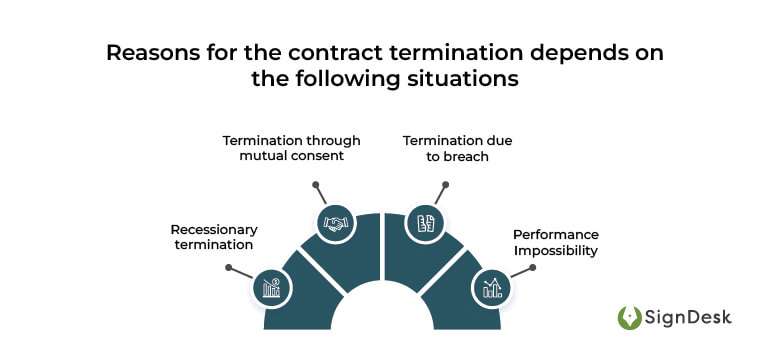Termination Of Contracts – What Is A Contract & How To Terminate One
Termination of contract is regarded as a legal procedure to end a contract before performance has been completed, with a reasonable basis. Deal termination is the most simple way to end a contract.
A contract is an enforceable legal agreement that creates, describes, and controls the parties’ rights and duties.
Contracts commonly include the transfer of commodities, services, money, or the promise to transfer any of these at a later date. Section 2(h) of the Indian Contract Act of 1872 defines a “Contract” as “An arrangement enforceable by law.” Several factors can also lead to the termination of a contract.
The Indian Contract Act provides that anyone can cancel a contract by providing legitimate reasons.
However, termination has no effect on the parties’ responsibilities for breaches of the contract that occurred previous to the contract’s termination. Moreover, despite the fact that future obligations to perform under the contract terms have been extinguished, the parties have the right to pursue claims for damages under common law and as provided by any provisions under the termination of the contract agreement.
Smart Contract Lifecycle Management (CLM) offers businesses an easy way to track contract obligations and adequately prepare for situations involving the termination of contracts.
Types Of Termination Of Contract
The termination of a contract can be done in two different ways:
1) Termination for Cause:
The right of a party to terminate a contract may emerge from general principles of contract law or from the provisions of the contract itself.
A worker or employee is terminated for cause when the worker or employee provides a reason for termination by an act or omission. Where the cause is judged unreasonable, such terminations may be contested as unjust. The cause’s existence and reasonableness are determined by facts, circumstances, statutes, and the nature of the contract.
2) Termination for Convenience:
Termination for convenience may arise exclusively from the terms of a contract that provide for such termination; there is no universal contract concept that permits such termination and solely is used for ending a contract.
Private commercial transactions can be ended by the parties with a fair time of notice, even if no explanation is given, under the conditions of a clause in the agreement enabling such termination.
Many concerns have been made about ending contracts without assigning any grounds; their legitimacy is frequently called into question, and it is now established that a clause allowing termination for convenience is valid and enforceable. Courts have ruled that where such termination is provided for in the contract, it cannot be disputed, even if it is malafide.
How To Terminate A Contract?
Organizations require tools to detect underperforming contracts, create a contract authoring process that includes standard notice of termination of the contract and a dynamic clause library, and ensure proper contract closeout through budget and invoice payment and tracking.
Steps must be taken to provide a more advanced process for termination of the contract that provides useful insight into where improvements can be made in the future.
Contract termination is one among numerous contract management challenges faced by businesses, for which smart CLM offers an easy remedy.
Here’s a three-step process for an expedited contract termination procedure using a leading contract management technology.
Step 1: Evaluate Contracts That Don’t Achieve Growth Objectives.
Utilities that compare contract performance data to past years’ data can provide firms with valuable contract analytics insights. For these goals, contract performance data systems can provide graphically appealing tools.
Organizations can track missed payment and delivery milestones depending on when a counterparty should have made a payment or delivered a product in accordance with the terms and conditions of a contract. This procedure can be expedited by using a strong contract management solution that allows organisations to set up automated contract workflow updates for users if payments and deliverables are not reached by the due date.
Step 2: Generalize Contract Termination Letter
Organizations can use termination templates from the template library of their contract management software system. They can insert crucial information into a contract termination letter by using contract data field placeholders.
Contract termination notices for contracts that are about to expire can be written using a conventional document authoring method. The option to email a letter for termination of the contract as a templated email from within a software system or to external users simplifies and streamlines this process even further. It also sets the mail template as a good termination of contract example.
As a result, firms do not need to waste time honouring contractual obligations that may cost them money, harm their reputation, or divert their attention away from more profitable contracts.
Step 3: Promote Contract Closeouts
Contract management software can assist firms in facilitating effective contract closeouts while generating useful information to support the health of future contracts at contract termination. To avoid penalties, organizations can use contract management software’s financial tracking tools to assist them in successfully managing expenditures and staying under their budget limit before contract closeout. Organizations can also determine the contract’s residual budget following contract rescission.
Why Terminate Contracts?
The contract termination clause is an essential component of every contract, and firms should identify their exit options from the start, or they risk being bound to a contract that isn’t performing.
In a business contract, situations may arise where there is a need to terminate the contract. The reasons for contract termination depend on the situation:

-
Recessionary termination:
Recession termination differs from contract termination. When the recession is available for contract termination, it unravels the contract as null and void, as if the deal was never negotiated and signed.
-
Termination through mutual consent:
Contracts are always available for the parties to agree on additional terms, such as the power to terminate by agreement. When terminating by agreement, the parties involved consent to the termination and their responsibilities are terminated.
-
Termination due to breach:
A breach of contract is a violation of a party’s agreed-upon terms and conditions under a legally binding contract. A breach could be anything from a late payment to the disclosure of sensitive information.
-
Performance Impossibility:
The impossibility of performance happens when one party is unable to perform their contractual commitments due to changes and circumstances that prevent them from doing so.
Before terminating a contract, the party wishing to do so should evaluate the relationship between the parties involved; if the relationship is ongoing, an alternative approach such as renegotiating the conditions may be more appropriate.
Remedies To Termination Of Contracts
A contract can be terminated in a variety of ways, and the judiciary has played an important role in interpreting and expanding the idea of contract termination. In the event of a breach-of-contract termination, it is critical to balance the rights of both parties and conclude the matter with equitable consequences for all parties.
Damages, quantum meruit, suit for rescission, specific performance, and injunction are all available remedies for contract breach or termination. The parties frequently seek legal counsel in order to examine all of the possibilities or remedies in their cases and select the one that will be most beneficial to them.
Quantum meruit translates as “the amount one deserves” or “the quantity one has earned.” In most circumstances, it refers to a demand for reasonable payment for services or commodities provided to the defendant.
For a detailed account of the remedies available, read our article on contract breaches.
Contract Lifecycle Management: A One-Stop Solution For Smarter Contracts
Smart contract automation management may significantly minimize process inefficiencies and allow firms to run more efficiently. CLM is a cutting-edge solution that addresses all of the issues that businesses have when using a standard document management system.
CLM is essential for any company looking to digitize its agreements and implement a more effective contract management procedure. Since contract management needs to be scaled along with business size, a strong solution is required to address the contract inefficiencies that develop.
Contract lifecycle management along with contract manufacturing software, provides an enterprise-wide platform for firms to mitigate documentation issues including contracts with low visibility, challenges in collaboration, and poor contract management practices. This platform also helps manage changes to contracts, such as distinguishing between an addendum vs amendment.
CLM provides a number of features that can successfully address the issues associated with traditional document management methods such as the termination of contracts.
SignDesk enables organisations to digitize their contract administration process from draft to renewal. SignDesk’s CLM Software is intended to address the numerous contract management difficulties. It accomplishes this by digitizing every stage of contract administration, beginning with the initial draft and extending to activities such as performance tracking and post-execution analysis.
SignDesk’s smart contract solutions make the documentation process easier for businesses. Contact our solution specialists to see how CLM can revolutionize your contracting process and help your business flourish.
Get in touch with our CLM experts to understand how SignDesk can change the way you manage your business contracts, including issues related to breach of contract.
Get a free trial now!
